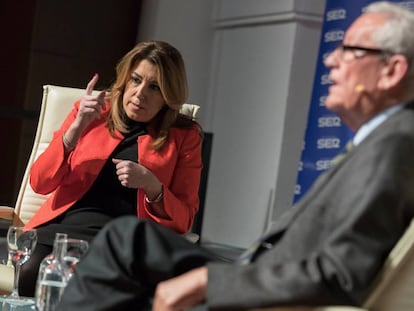Fugitives without privileges
The withdrawal of the European arrest warrant for Puigdemont leaves his hypocrisy clear to see for his supporters

The withdrawal of the European arrest warrant against the ousted premier of Catalonia, Carles Puigdemont, and against four former ministers of his government who fled to Belgium with him, is not a sign of weakness, nor of fear or resignation on the part of the Spanish justice system. It is exactly the opposite. The measure adopted in the writ for the withdrawal by Supreme Court Judge Pablo Llarena is in line with the plan to prevent the fugitives avoiding prosecution for some of the crimes for which they are being investigated (such as that of rebellion), and to prevent certain actions not being included in the judicial process ¨C both of which would damage the principle of universal application of the law and the principle that states no crime should go unpunished.
If the above were the case, the fugitives would end up enjoying unbalanced and privileged treatment compared to the politicians and former ministers who stayed in Spain, and who had the dignity to assume the responsibilities of their acts of rebellion against the constitutional and statutory order in Spain. These figures will answer for all of their alleged illegal acts in the Spanish courts.
The fugitives must return now,? face up to their responsibilities and defend themselves without showboating
Therefore, the decision of the Supreme Court seeks to assure equality of treatment and equality of the result, and to ensure the principle that the same penalty applies for the same crime. These judicial notions have great sway as a civic imperative: they seek to prevent negative discrimination in all cases at all times. With its decision, the Supreme Court is also correcting the perhaps hasty decision to issue the arrest warrant on the part of High Court Judge?Carmen Lamela, from whose jurisdiction the Supreme Court has now taken over the case against those who allegedly broke the law as part of the Catalan independence push.
The decision is based on the concept that rebellion is both an individual and a collective crime ¨C the product of a strategy shared by various players in which each person plays a role that is connected to the rest of the participants. To break up this case or to separate the criminal figures involved ¨C as the rules of the European arrest warrant would allow for in cases where the crimes codified in one country do not exist in the country from which a suspect would be handed over ¨C would lead to an unfair trial for everyone. Some would pay a higher price than others.
The fact that the decision to withdraw the European arrest warrant could temporarily reduce the political pressure on the fugitives in Brussels is, however, a poisoned chalice for them. Because it has now been confirmed that with the payment of a small bond the vast majority of them could enjoy the same liberty enjoyed by the others.
The decision of the Supreme Court seeks to assure equality of treatment and equality of result
If the fugitives were to stand honestly in the Catalan elections of December 21, they would have to return to go on the campaign trail, and, if elected, take their seats in the regional parliament. If they don¡¯t return, it will be clear to their voters that what they are asking for is a sham: it would not serve the purpose for which it is theoretically designed. And if the fugitives do not return because they are afraid of spending a few days in prison, it will become clear that they joined the electoral contest in search of a political shield. And it would give them a license to do what they like in terms of continuing with the noisy propaganda that has already done so much to damage the Catalans, as can be seen with the region¡¯s failure to become the new home of the European Medicines Agency. Their squabbles were enough to see Barcelona ruled out.
The fugitives must return now. They have to face up to their responsibilities. They must defend themselves without showboating. And they must not abandon those who ¨C wrongly ¨C trusted in them.
English version by George Mills.
Tu suscripci¨®n se est¨¢ usando en otro dispositivo
?Quieres a?adir otro usuario a tu suscripci¨®n?
Si contin¨²as leyendo en este dispositivo, no se podr¨¢ leer en el otro.
FlechaTu suscripci¨®n se est¨¢ usando en otro dispositivo y solo puedes acceder a EL PA?S desde un dispositivo a la vez.
Si quieres compartir tu cuenta, cambia tu suscripci¨®n a la modalidad Premium, as¨ª podr¨¢s a?adir otro usuario. Cada uno acceder¨¢ con su propia cuenta de email, lo que os permitir¨¢ personalizar vuestra experiencia en EL PA?S.
?Tienes una suscripci¨®n de empresa? Accede aqu¨ª para contratar m¨¢s cuentas.
En el caso de no saber qui¨¦n est¨¢ usando tu cuenta, te recomendamos cambiar tu contrase?a aqu¨ª.
Si decides continuar compartiendo tu cuenta, este mensaje se mostrar¨¢ en tu dispositivo y en el de la otra persona que est¨¢ usando tu cuenta de forma indefinida, afectando a tu experiencia de lectura. Puedes consultar aqu¨ª los t¨¦rminos y condiciones de la suscripci¨®n digital.










































